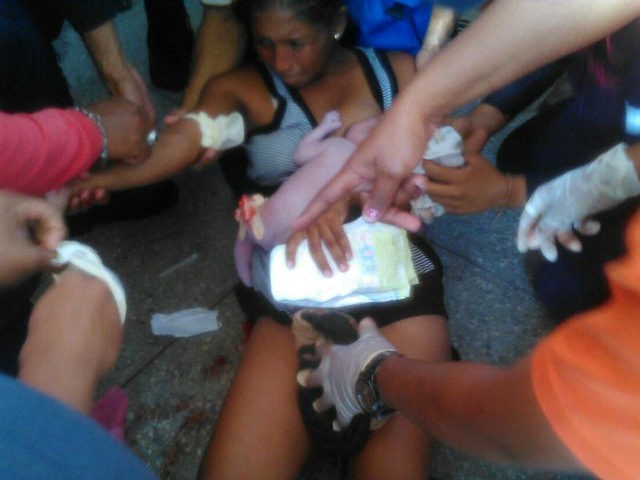A pregnant woman waiting in an outdoor line to purchase rationed groceries in socialist Venezuela suddenly went into labor last week, giving birth surrounded by a crowd in the middle of the street.
The incident, its conclusion caught on video, serves as a stark reminder of the hardships Venezuelans face: standing in food lines for hours for rationed food and forced to handle medical emergencies with few resources.
The details of the incident remain unknown, though, thanks to President Nicolás Maduro’s gross economic mismanagement and food rationing system, a Venezuelan can expect to stand in line for five to eight hours to gain entry to a supermarket. Often, whether or not the market still has the items the shopper expects to purchase is a gamble. The distressing situation has fed into a large underground market of goods such as laundry detergent, diapers, and basic food supplies.
The unidentified woman’s struggle surfaced on social media where a citizen activist posted a photo of the woman holding her child while sitting on the blood-stained asphalt.
Y así llegó al mundo este bebe en plena cola en el Hipermercado Lahu #Coro #QueDificilNacerEnVenezuela #10m
Tendrán un mejor país Francisco! pic.twitter.com/sMeEtxNPDe— Vanessa Flores (@VanessaFlores_1) March 11, 2017
“That is how this baby came to the world, on the middle of a line in Lahu Supermarket,” anti-government activist Vanessa Flores wrote on Twitter. The incident occurred in the city of Coro, Falcón state.
Video later surfaced on YouTube of the final moments of the woman’s labor as emergency services personnel carried her and the infant away. A crowd of other individuals in the line to enter the supermarket had formed around her to ensure her safety and cheered when she gave birth.
Flores, the activist who brought the story to the public eye, later posted updates from the hospital, identifying the child as “Daniel” and noting that his mother did not have the means to provide for him, nor did the Venezuelan government aid the mother given the alarming circumstances of her delivery.
Hoy me fui a ver a Daniel bebe bendito ya con su mama! No le dieron NADA de lo q se dice en Coro ni los pañales x lo q hizo la cola la madre pic.twitter.com/H2nG4nRpsQ
— Vanessa Flores (@VanessaFlores_1) March 11, 2017
“Today I went to see Daniel, the blessed baby with his mother! They did not give them ANYTHING… not even diapers after what the line did to his mother,” Flores wrote.
Lo bueno de este muñeco es q esta sano y debe estar destinado a hacer grandes cosas! Dios lo cuide y bendiga xq es un bebe hermoso #enamora' pic.twitter.com/1K8wejLbkZ
— Vanessa Flores (@VanessaFlores_1) March 11, 2017
“The good news about this doll is that he is healthy and will be destined for great things!” Flores wrote. “God protect and bless him because he is a handsome baby.”
The incident recalled a similar panic outside a hospital in Maracay, Venezuela, last year. The hospital had rejected a pregnant woman who insisted she was in labor; the woman was forced to give birth on the street outside the facility.
Giving birth in Venezuela is a struggle even when privileged with a hospital stay. Rates of both mother and infant mortality have skyrocketed in the past several years as hospitals struggle with medical supply shortages and mothers struggle to properly feed themselves while carrying their child. According to the Venezuelan newspaper El Nacional, 10,500 infants died in Venezuelan hospitals in 2016. 18.6 out of every 1,000 newborns died, a statistic unseen since 1999.
Maternal mortality rates increased even more. 750 women died in Venezuela in 2016 – 64 a month – due to complications during birth, a statistic that the nation had not seen since 1958.
By 2015, incidents of infant mortality had already increased 1000 percent since 2012, the last full year late dictator Hugo Chávez governed.
Hospitals in Venezuela often lack basic medicines and medical supplies. In one hospital, Univisión found that rooms, which staff could not clean due to a shortage in cleaning supplies, were being essentially used as closets. Another hospital recorded 17 infant deaths in 2015 after an opossum infestation took over the maternity ward; staff did not have the means to procure any extermination or hygiene products.
By mid-2016, Venezuelan hospitals were requesting that patients bring their own medicine with them to the hospital if they expected to be treated as the hospitals could not guarantee that the medicine in question would be in stock. A variety of drugs – from expensive cancer and HIV treatments to birth control and ibuprofen – are luxuries most Venezuelan hospitals struggle to keep in stock.
The Venezuelan Pharmaceutical Federation declared a “humanitarian emergency” due to the lack of drugs in the country in 2016, condemning Maduro’s socialist policies for preventing the easy importing of drugs into the country.
In response, the Maduro regime ordered the military to seize and control all medical supplies in the country “to guarantee that these medicines and supplies get to the patient efficiently and are neatly distributed and assigned.”

COMMENTS
Please let us know if you're having issues with commenting.